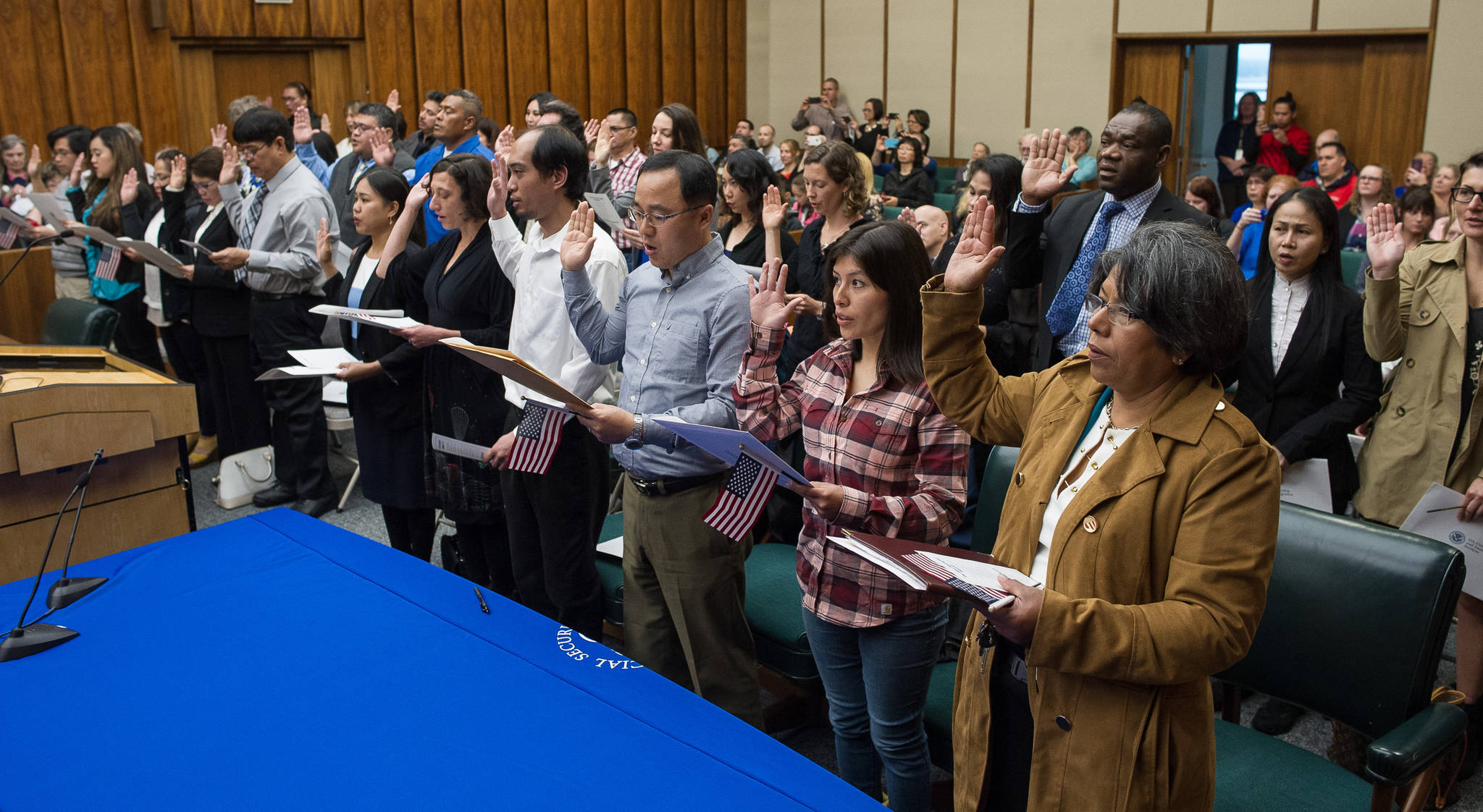Hakan Sebcioglu was a young boy living on the coast of Turkey when his uncle, who was working in Germany, sent him a postcard.
The postcard didn’t feature a German scene, however. It was of Anchorage.
“I don’t remember every word (of the card), but he was trying to tell me I should have a large vision — that I should expand my horizons,” Sebcioglu said.
The Turkish native laughed to think that, all these years later, he ended up living in Ketchikan.
As Sebcioglu explains it, he came to Alaska as so many do, on a cruise ship. He was working on the ship and met the woman who became his wife while she was working for a tour operator.
Sebcioglu has been living in Alaska since 2004. On Friday, he became a U.S. citizen, one of more than 30 immigrants taking their oaths in the Robert Boochever Courthouse in Juneau.
The federal courtroom was packed for the naturalization ceremony, which was presided over by Judge Scott A. Oravec, current Magistrate Judge for the U.S. District Court in Fairbanks.
The majority of those becoming Americans at the Juneau ceremony were from the Philippines, with the remainder coming from countries as diverse as Nigeria, Chile, Australia, Tonga and Ukraine.
“I share with you the pursuit of the American dream,” Oravec told the crowd, noting that immigration authorities changed the name of his Hungarian great-grandfather when he arrived at Ellis Island.
“Today is finally here,” he added. “To get here, you faced adversity and you overcame adversity. … I ask you to stay true to those values.”
As each new citizen received their certificate of naturalization and shook Oravec’s hand, they told the family members and friends assembled where they came from and added a few words, most saying simply that they were proud and happy.
“I felt American (in my) heart, and now it’s official,” said Bereniz Montoya-Pezo, of Peru.
Montoya-Pezo said she came to Alaska initially six years ago on a nonimmigrant visa, and then went through the process to obtain an immigrant visa and begin the journey to become a citizen.
In order to apply to become a U.S. citizen, you must be at least 18 and must have been a permanent resident for the past three or five years (depending on the provision of law under which you are eligible to naturalize). You must also be able t0 read, write, and speak basic English and demonstrate a knowledge and understanding of U.S. history and government, as well as demonstrate good moral character and loyalty to the principles of the U.S. Constitution.
During an interview with an immigration services officer, you must take and pass English and civics tests; a practice civics test you can take online poses questions that range from Civil War facts to constitutional knowledge.
Montoya-Pezo said she didn’t find the test that difficult, explaining, “I have three kids who are learning that in school, so I was learning that with them.”
Julie Lekwauwa wiped tears from her eyes as her Nigerian-born husband, Chima, received his certificate.
“‘I’m very grateful to be here,” he said. “Today, a new story will be added to this great country. Truly, this goes into history — (this date) will never be removed.”
Julie said it has been a 10-year journey for the couple, which started when Chima left Nigeria for Benin. Initially, she said, they tried to get him a visitor visa; she then went to visit him in Benin and eventually succeeded in obtaining a fiance visa, which took two years.
The naturalization process, Julie said, was exhausting and expensive.
Was it worth it?
Chima just smiled, as Julie exclaimed, “Yes! It’s been a long struggle, but we’re glad.”
• Contact reporter Liz Kellar at 523-2246 or liz.kellar@juneauempire.com.

